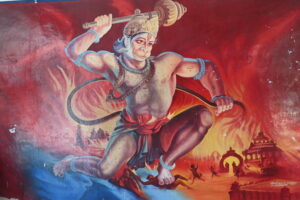
Photo copyright: Satyabrata Maiti
Lord Hanuman is one of the most revered Gods of Hindus. He is an ocean of strength and wisdom and is considered as a direct incarnation of Lord Shiva. He is respected as a symbol of supreme Bhakti that he had on Lord Rama. Hanuman Chalisa describes his power and he is a symbol power too. When he was asked to bring a plant from “Gandhamadan Parvat” for the treatment of Lakshmana before the sunrise, he brought the entire “Parvat” to Lanka where Rama and Ravan battle was going on since he could not identify the “Mritasanjavini plant” which could give the life to Lakshmana. That was the power of him. He is worshiped as “Sankatabhanjan” at a time of crisis.
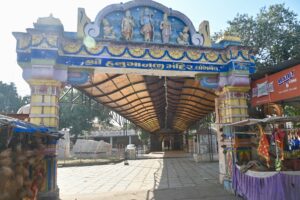
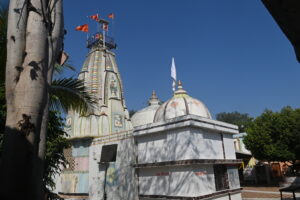
Bharat has many ancient Hanuman temples and one such temple is located in Lambhvel village in Anand, Gujarat.Lambhvel village is located just about 2.5 km away from Anand township on the Ananad –Nadiad highway which is known as Dandi Yatra Road. Temple is about more than 500 years old dedicated to lord Hanumanji. Lambhvel Hanumanji temple is famous for Swayambhu (Self manifested) idol of Lord Hanumanji.
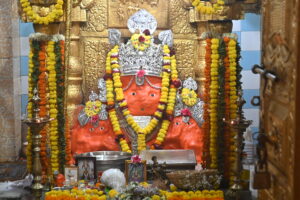
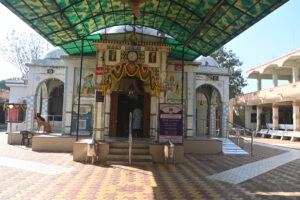
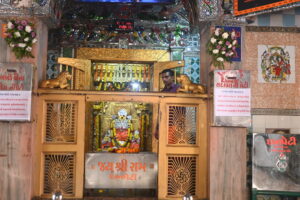
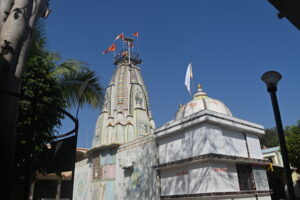
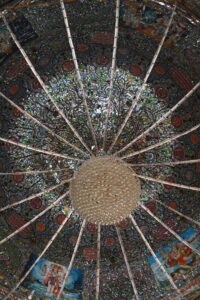
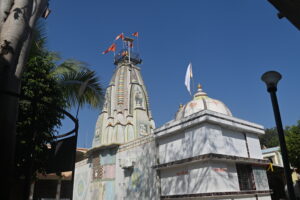
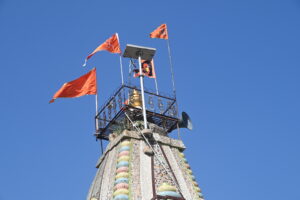
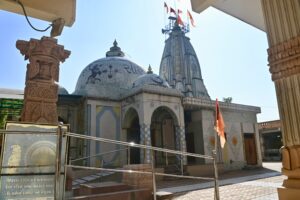
The mythological tale associated with the temple:
It dates back to around 16th century. A small cowboy named Lambhu used to take cows for grazing in the forest. While the cows grazed, Lambhu would play his flute joyfully. One beautiful cow in his herd would stand near a specific “aakda” (Calotropis spp) plant every day and release a stream of milk onto the plant before returning home with the rest of the cows which Lambhu was quite unaware of. However, he observed that whenever, he tried to milk this cow, it would yield no milk. Curious about this behaviour, Lambhu decided to keep a watch over the cow to understand the mystery behind it. He prevented the cow for leaving the herd one day. Unable to go to the “aakda” plant, the cow became restless and escaped from the shed at night. Lambhu followed the cow secretly and found that the cow went straight to the “aakda” plant and stood over it, releasing a stream of milk. Lambhu was astonished and went to sleep that night with deep thoughts about what he saw.
That night, he had a dreamadvising to dig that spot. Next day, as he dug, his spade struck something hard, revealing a reddish hue. He stopped digging and carefully removed the soil with his hands, uncovering a beautiful hanumanji idol. His dream had come true as the idol was discovered during this excavation. Following proper rituals, a grand temple was constructed and the idol was officially enshrined on “Shravan Sud Ashtami” in 1523 CE (Vikram Samvat 1579).
It is believed that the village was named as Lambhavel after Lambhu’s Hanuman-ji.
Excellent facilities in the temple
Excellent facilities have been created for devotees and travellers visiting from other parts of the country. A “dharmashala” is run for visitors. The temple premises host several social and charitable activities. Spread over approximately three acres, the temple maintains an inclusive tradition of distributing free food for all from its inception. Key festivals celebrated here include Lord Ram’s birth, Hanuman Jayanti, and the day of the idol’s consecration.
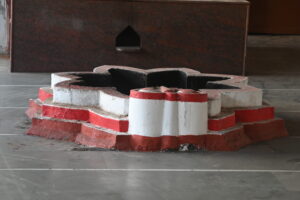
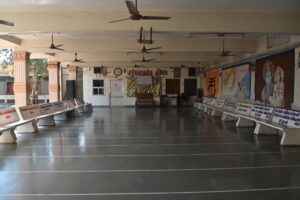
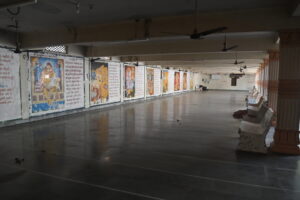
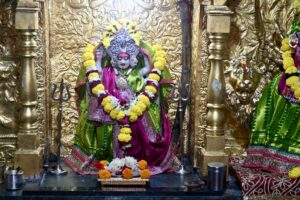
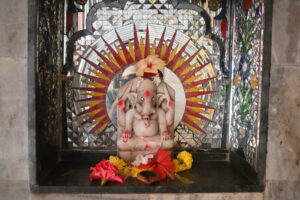
The temple complex includes a well-equipped Yajna Shala for conducting Maruti Yajnas, which is available for any devotee to use. Additionally, a charitable dispensary operates within the premises, where many doctors provide honorary free services. Adjacent to the temple there are two gardens which are frequently used for religious and social events. During the month of Shraavan, devotees gather in large numbers to seek blessings and participate in the festivities. A grand fair is held here on “Janmashtami” day. A significant crowd also gather on Shravan Saturdays. Mass marriage is also organized here.
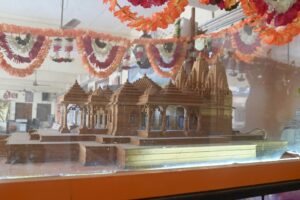
Construction of new temple for relocation of the present Temple
After the construction of Rama Temple in Ayodhya, the Lambhvel Hanumanji temple committee also prepared a grand plan for renovation and construction of a new temple complex with the help of devotees. A new plan has been in operation. Two stones from Hampi (Kishkindha Kshetra, the birth place of Hanumanji), Karnataka have been brought for this purpose. Model of the “would be” temple complex is ready now and stone carving has been started. It is estimated that the new temple would be ready by 2026.
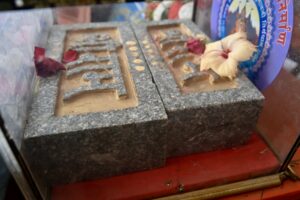
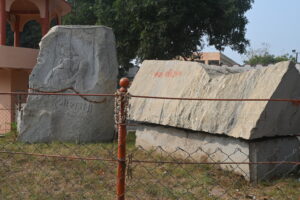
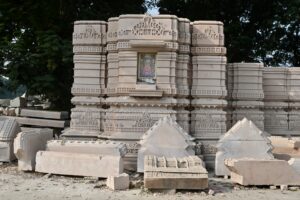

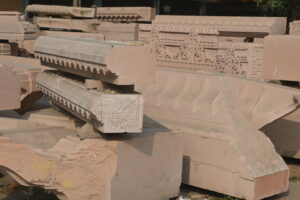
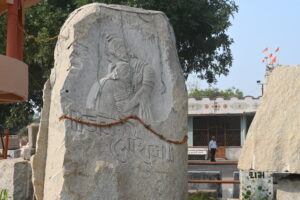
Other activities
The Lambhvel Fair is celebrated on last Saturday of “Shravan” Month of Gujarati calendar.
A huge fair is organized here on “Kali Chaudash” in Diwali time. Hanuman Jayanti is also celebrated in a grand fashion. Hanuman Chalisa and Sunderkand Path are organized by the temple committee on regular basis. Hanumanji temple committee also run a hospital where doctors give there service voluntarily. Every devoted wishes are fulfilled by Lord Hanumanji.
Jai Bharat!
Sataybrata Maiti
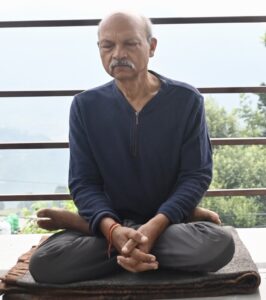
Acknowledgement
- The Temple Committee for allowing me to take the photographs;
- Geetha, K. A., who introduced me to the Temple Committee for taking photographs and also adding mythological inputs;
- Aarti Kawane for helping me some Gujarati literature translated in English for my understanding;
- On line literature resources used for the write up.


Well narrated accompanied by excellent pics.👏 Please note that all the temples, especially the old ones have what is called,’ Sthala Purana’ , roughly translating a fictional story of its origin.
Jai Hanuman 🙏
Pretty part of content. I simply stumbled upon your blog and in accession capital
to say that I get in fact loved account your weblog
posts. Anyway I will be subscribing for your augment and even I achievement you access consistently rapidly.
Do you have any video of that? I’d like to find out some
additional information.
Post writing is also a excitement, if you be familiar with after
that you can write if not it is difficult to write.
Write more, thats all I have to say. Literally, it seems as though you relied on the video to make your point.
You clearly know what youre talking about, why waste your intelligence on just posting videos to your blog when you
could be giving us something enlightening to read?
Woah! I’m really loving the template/theme of this site.
It’s simple, yet effective. A lot of times it’s
tough to get that “perfect balance” between usability and appearance.
I must say you’ve done a very good job with this. Additionally, the blog
loads very fast for me on Chrome. Exceptional Blog!
Its like you read my mind! You seem to know so much about this, like you
wrote the book in it or something. I think that you can do with some pics to drive the message home a little
bit, but other than that, this is fantastic blog.
A great read. I’ll certainly be back.
Link exchange is nothing else except it is just placing
the other person’s web site link on your page at suitable place and other person will
also do similar in favor of you.
It’s a shame you don’t have a donate button! I’d without a doubt
donate to this brilliant blog! I suppose for now i’ll settle for book-marking and adding
your RSS feed to my Google account. I look forward to fresh updates and will talk about this website with my Facebook
group. Chat soon!
Amazing! This blog looks just like my old one! It’s on a completely different subject but it has pretty much the same layout
and design. Wonderful choice of colors!
Hi colleagues, its great piece of writing about cultureand entirely explained,
keep it up all the time.
Hmm is anyone else having problems with the pictures on this blog loading?
I’m trying to figure out if its a problem on my end or if it’s the blog.
Any responses would be greatly appreciated.
It’s hard to come by well-informed people on this subject, however, you seem like you know what you’re talking about!
Thanks
excellent issues altogether, you just gained a new reader.
What would you suggest about your submit that you just made some
days ago? Any certain?
I’m really enjoying the theme/design of your website.
Do you ever run into any web browser compatibility issues?
A small number of my blog visitors have complained about my blog not working correctly in Explorer but looks great in Chrome.
Do you have any tips to help fix this problem?
I blog often and I genuinely thank you for your content.
This great article has really peaked my interest. I will book mark your website
and keep checking for new details about once
a week. I opted in for your RSS feed as well.
WOW just what I was looking for. Came here by searching for Libertex MT5
Unquestionably imagine that which you stated.
Your favorite reason appeared to be at the web the easiest
factor to understand of. I say to you, I definitely get irked even as other folks think about worries
that they plainly do not recognise about. You controlled to hit the nail upon the
highest and also defined out the entire thing without having side-effects , people could take a signal.
Will probably be again to get more. Thank you
Hello my friend! I wish to say that this article is amazing, great written and come with almost all important infos.
I’d like to see more posts like this .
Pretty! This was an incredibly wonderful article.
Thanks for providing this info.
I am extremely impressed with your writing talents as smartly as with the structure to your weblog.
Is this a paid theme or did you customize it yourself?
Either way stay up the excellent quality writing, it is uncommon to look a great blog like
this one today..
I think what you typed made a ton of sense. However, think about this, what if you added a little information?
I am not saying your information is not good, however suppose you added something to
maybe grab people’s attention? I mean The Swayambhu Hanumanji Temple at
Lambhvel, Anand, Gujarat | Satyabrata Maiti Blog is kinda plain. You ought
to glance at Yahoo’s front page and see how
they write news titles to grab people to click. You might
add a video or a related picture or two to get readers interested about everything’ve got to say.
Just my opinion, it might make your posts a little
livelier.
Hi! I’ve been following your web site for some time now and
finally got the courage to go ahead and give you a shout out from
Houston Tx! Just wanted to mention keep up the great job!
Somebody necessarily lend a hand to make critically articles I might state.
That is the first time I frequented your web page and up
to now? I amazed with the research you made to create this actual submit extraordinary.
Fantastic job!
Spot on with this write-up, I absolutely feel this web site needs a
lot more attention. I’ll probably be returning to see more,
thanks for the information!
Hey there! This post couldn’t be written any better!
Reading through this post reminds me of my previous room mate!
He always kept talking about this. I will forward this
article to him. Fairly certain he will have a good read.
Thanks for sharing!
Your mode of explaining all in this piece of writing is in fact nice,
all be able to easily understand it, Thanks a lot.
I feel that is one of the most important information for me.
And i am happy studying your article. However wanna remark on some basic issues, The web site taste is great,
the articles is in reality nice : D. Just right activity, cheers
With havin so much content and articles do you ever run into any
problems of plagorism or copyright violation?
My blog has a lot of unique content I’ve either written myself or outsourced but it
looks like a lot of it is popping it up all over the internet
without my authorization. Do you know any ways to help stop content from
being ripped off? I’d genuinely appreciate it.
Heya i’m for the first time here. I came across this board and
I in finding It truly useful & it helped me out a lot. I hope to present one thing back and aid others like you aided me.
Hi there, just became aware of your blog through
Google, and found that it’s truly informative. I am going to watch out for brussels.
I will appreciate if you continue this in future. Lots of people will be benefited from your writing.
Cheers!
I have fun with, result in I found exactly what I was looking for.
You’ve ended my 4 day long hunt! God Bless you
man. Have a great day. Bye
Hello, i read your blog from time to time and i own a similar one and i was just wondering if you get a lot
of spam feedback? If so how do you reduce it, any plugin or anything you can recommend?
I get so much lately it’s driving me crazy
so any assistance is very much appreciated.
I get pleasure from, cause I discovered just what I used to be looking for.
You have ended my four day long hunt! God Bless you
man. Have a nice day. Bye
It’s a shame you don’t have a donate button! I’d definitely donate to this excellent blog!
I guess for now i’ll settle for bookmarking and adding your RSS feed to my Google account.
I look forward to brand new updates and will talk about this site with my Facebook group.
Chat soon!
I am sure this post has touched all the internet visitors, its
really really good post on building up new webpage.
I always used to read piece of writing in news papers
but now as I am a user of internet thus from now I am using net
for articles or reviews, thanks to web.
Heya are using WordPress for your blog platform?
I’m new to the blog world but I’m trying to get started and create my own. Do you require
any coding expertise to make your own blog? Any help would be greatly appreciated!
Thank you a lot for sharing this with all people you really understand what
you are speaking about! Bookmarked. Please also discuss with my
site =). We can have a hyperlink change arrangement among us
What’s up, its fastidious article on the topic of media print, we all be aware
of media is a great source of data.
This article offers clear idea for the new people of blogging,
that genuinely how to do blogging and site-building.
Thanks for ones marvelous posting! I really
enjoyed reading it, you’re a great author. I will
remember to bookmark your blog and may come back later on. I want to encourage you continue
your great posts, have a nice afternoon!
I was curious if you ever thought of changing the layout of your
website? Its very well written; I love what youve got to say.
But maybe you could a little more in the way of content so people could connect with
it better. Youve got an awful lot of text for only having 1 or 2 images.
Maybe you could space it out better?
Heya i am for the primary time here. I came across
this board and I in finding It truly helpful & it helped me out much.
I hope to present one thing back and aid others such as you aided me.
It’s remarkable to visit this web site and reading the views
of all colleagues about this article, while I am also eager of getting experience.
It’s going to be finish of mine day, except before finish I am reading
this fantastic paragraph to increase my experience.
Appreciating the persistence you put into your website
and in depth information you offer. It’s
awesome to come across a blog every once in a while that isn’t the same old rehashed information. Fantastic
read! I’ve bookmarked your site and I’m adding your RSS
feeds to my Google account.
Its not my first time to go to see this website, i am visiting this website dailly and obtain good data from here
daily.
My programmer is trying to persuade me to move to
.net from PHP. I have always disliked the idea because of the expenses.
But he’s tryiong none the less. I’ve been using Movable-type
on a number of websites for about a year and am anxious about switching to another platform.
I have heard very good things about blogengine.net.
Is there a way I can import all my wordpress posts into
it? Any kind of help would be really appreciated!
Do you mind if I quote a few of your articles as long as
I provide credit and sources back to your blog? My blog site is in the very
same niche as yours and my visitors would certainly
benefit from some of the information you present here.
Please let me know if this alright with you. Cheers!
Hello there! This blog post couldn’t be written much
better! Going through this article reminds me of my previous roommate!
He always kept preaching about this. I’ll send this post to him.
Fairly certain he will have a good read. Thanks
for sharing!
It’s going to be end of mine day, however before end I am reading this enormous article to increase
my know-how.
Have you ever thought about including a little bit more than just your articles?
I mean, what you say is important and all. But think about if you added some great
pictures or video clips to give your posts more,
“pop”! Your content is excellent but with pics and video
clips, this blog could certainly be one of the greatest in its niche.
Wonderful blog!
Thanks , I’ve just been searching for information about this subject for ages and yours is the greatest I’ve discovered till now. But, what about the bottom line? Are you sure about the source?
This is my first time visit at here and i am really happy to read everthing at one place.
What’s up mates, its impressive post concerning educationand fully
explained, keep it up all the time.
Pretty! This has been a really wonderful article.
Many thanks for supplying these details.
Does your blog have a contact page? I’m having problems locating it
but, I’d like to shoot you an email. I’ve got some recommendations for your blog you might be interested in hearing.
Either way, great blog and I look forward to seeing it improve over time.
Howdy! I know this is kinda off topic but I’d figured I’d ask.
Would you be interested in trading links or maybe guest authoring a blog post or vice-versa?
My blog addresses a lot of the same topics as yours and I feel we
could greatly benefit from each other. If you are interested feel free
to send me an email. I look forward to hearing from
you! Terrific blog by the way!
What’s Taking place i am new to this, I stumbled upon this I have
discovered It absolutely helpful and it has aided me out loads.
I’m hoping to contribute & aid other users like its helped me.
Great job.
The other day, while I was at work, my cousin stole my iPad and tested to
see if it can survive a 30 foot drop, just so she can be
a youtube sensation. My apple ipad is now broken and
she has 83 views. I know this is totally off topic but I had to share it with
someone!
Hmm is anyone else having problems with the images on this blog loading? I’m trying to find out if its a problem on my end or if it’s the blog. Any feedback would be greatly appreciated.
Incredible story there. What happened after?
Thanks!
I’m really impressed with your writing skills and
also with the layout on your blog. Is this a paid theme or did
you customize it yourself? Anyway keep up the excellent quality writing,
it’s rare to see a great blog like this one these days.
I do not know if it’s just me or if everybody else encountering issues with your site.
It appears like some of the text within your content are running off the
screen. Can someone else please comment and let me know
if this is happening to them as well? This may be a issue with my web browser because I’ve
had this happen before. Cheers